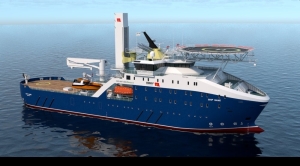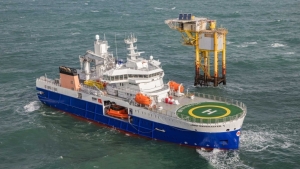eSOV for £20 million with Innovate UK. The market needs 300 SOV

 By Marek Grzybowski
By Marek Grzybowski
UK innovation agency Innovate UK has awarded £20 million to build large service vessels (SOVs) that can operate with zero emissions. The agency and the beneficiary claim that this is the first unit of this type. In Poland, we are still wondering whether to build SOVs at all. The British announce a series of zero-emission eSOVs.
The project is to initiate the construction of a series of electric units. The ships will be intended to operate in the offshore wind energy industry. They are scheduled to enter the open waters by 2028. Plans for the ships, which will be operated by Bibby Marine, include a 20 MWh propulsion unit. This should be enough, with charged batteries, to perform two weeks of surgery. An element of the project is the construction of a charging installation. It will ensure that the ship’s batteries can be fully charged in the port of Aberdeen.
Bibby Marine will lead the project
The project is led by Bibby Marine and project partners include the Port of Aberdeen, Shell, ORE Catapult, DNV and Kongsberg and Liverpool John Moores University Liverpool (LJMU). According to Innovate UK, this consortium will enable the activation of the shipyard and its cooperators. The investment in offshore innovation is intended to ensure the renewal of activity of the shipbuilding industry in Great Britain with a scientific base. Project partners forecast that by 2050, as many as 300 SOVs will be needed in the offshore wind industry alone. Currently, there are no electric-powered units with two-week autonomy in operation.
Bibby Marine has announced that it has hired Longitude Engineering to design a first-of-its-kind zero-GHG operational vessel (SOV).
The “eSOV” project, as the project partners call it, was initiated in September 2023. The £20 million is part of the funds obtained for the vessel as part of the competition for zero emission vessels and infrastructure (ZEVI – Zero Emission Vessel and Infrastructure).
“This project is a natural progression on our decarbonization journey as we aim to operate a low or zero carbon vessel by 2026,” said Nigel Quinn, director of Bibby Marine.
Nigel Quinn emphasized: “The British-designed vessel will be a game-changer for our industry and we are delighted to be working with some of the market-leading contractors and suppliers on this project, such as Longitude. Longitude’s experience in designing specialist vessels is essential for us to achieve our net zero goals and take our eSOV to the sea.”
Electric SOV on designers’ boards
eSOV is based on the OSD-IMT9605 design from Longitude Engineering. The ship will be powered in a hybrid system. The energy source will be a set of 20 MWh batteries. The ship will also have dual-fuel methanol engines with generators. Traditional generator systems will provide a safety system in the event of a voltage drop in the batteries. It was then possible to charge the batteries at sea.
It is emphasized that “The vessel will provide ultra-low emission support for the construction, operation and servicing of offshore wind farms in the offshore renewable energy sector in the UK.” It is expected that the project will also be positioned in other European countries. These forecasts are based on the growing European offshore wind market.
“While the development of our renewable energy infrastructure is progressing, decarbonizing the entire broad project value chain is also critical to continuing to accelerate our race to zero emissions,” said Dean Goves, director of marine design at Longitude Engineering.
He stressed that “studies have been carried out to investigate the carbon footprint of maritime operations related to the construction of offshore wind farms.”
– This project is the next step – technical development of a new solution. This could set the tone for the future decarbonization of ships operating at sea, Goves noted.
It was announced that “Longitude Engineering will employ a multidisciplinary team of marine engineers and consultants to work on this project, including ship designers, ship captains, design engineers, electrical engineers, methanol and energy storage specialists, hull designers, hydrodynamics specialists and others.

200 years on sea and land
Bibby Marine Group owns and operates a fleet of Walk-to-Work Service Operations vessels. They are managed by Bibby WaveMaster. Custom-designed and built in partnership with Damen, the WaveMaster vessel enables offshore wind operators to operate more efficiently, safely and in maximum comfort for up to 30 days.
Fuel systems with zero carbon dioxide emissions were tested on this ship as part of the WaveMaster Zero C research and development project. We informed about it in GospodarkaMorska.pl.
Bibby Marine can afford innovations because it is a company of the Bibby Line Group (BLG). It is a global company with diversified services worth GPB 800 million. The Group’s companies operate in 16 countries. GPB employs 4 thousand people in sectors including retail, financial services, distribution and rental of marine and construction equipment. BLG is one of the oldest family businesses in the UK. The company boasts 200 years of experience in providing customers with a variety of solutions.
It is emphasized that since 2007, the Bibby Line Group and its employees have donated over GBP 10 million and thousands of volunteer hours to over a thousand charitable causes. BLG is also a global provider of employee accommodation in floating hotels.
BLG’s fleet of five floating hotels has been offering accommodation for over 30 years. The company’s headquarters is located in Liverpool, the city of the Beatles and the famous football team.
